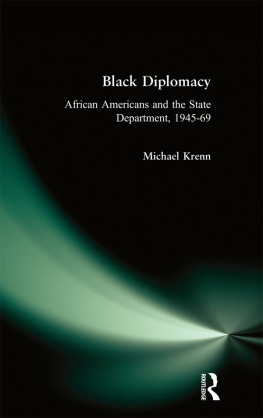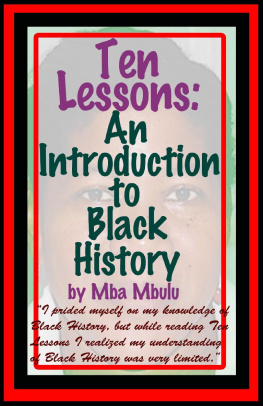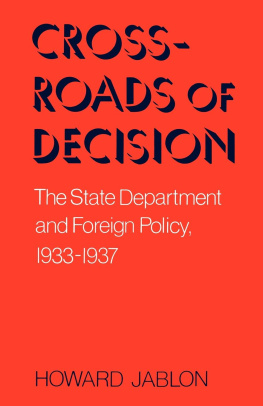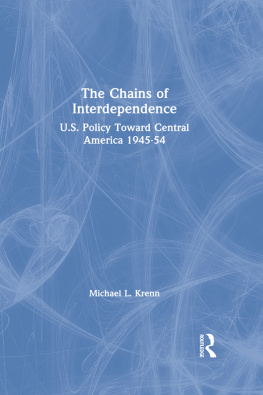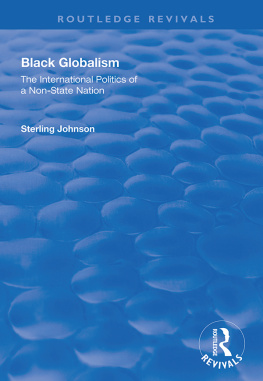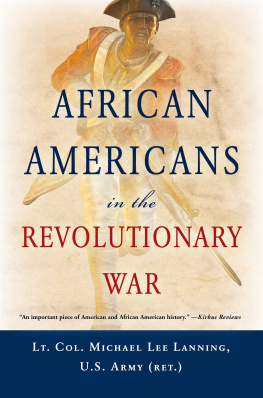Michael Krenn - Black Diplomacy: African Americans and the State Department, 1945-69
Here you can read online Michael Krenn - Black Diplomacy: African Americans and the State Department, 1945-69 full text of the book (entire story) in english for free. Download pdf and epub, get meaning, cover and reviews about this ebook. year: 1998, publisher: Routledge, genre: Politics. Description of the work, (preface) as well as reviews are available. Best literature library LitArk.com created for fans of good reading and offers a wide selection of genres:
Romance novel
Science fiction
Adventure
Detective
Science
History
Home and family
Prose
Art
Politics
Computer
Non-fiction
Religion
Business
Children
Humor
Choose a favorite category and find really read worthwhile books. Enjoy immersion in the world of imagination, feel the emotions of the characters or learn something new for yourself, make an fascinating discovery.
- Book:Black Diplomacy: African Americans and the State Department, 1945-69
- Author:
- Publisher:Routledge
- Genre:
- Year:1998
- Rating:3 / 5
- Favourites:Add to favourites
- Your mark:
- 60
- 1
- 2
- 3
- 4
- 5
Black Diplomacy: African Americans and the State Department, 1945-69: summary, description and annotation
We offer to read an annotation, description, summary or preface (depends on what the author of the book "Black Diplomacy: African Americans and the State Department, 1945-69" wrote himself). If you haven't found the necessary information about the book — write in the comments, we will try to find it.
Michael Krenn: author's other books
Who wrote Black Diplomacy: African Americans and the State Department, 1945-69? Find out the surname, the name of the author of the book and a list of all author's works by series.
Black Diplomacy: African Americans and the State Department, 1945-69 — read online for free the complete book (whole text) full work
Below is the text of the book, divided by pages. System saving the place of the last page read, allows you to conveniently read the book "Black Diplomacy: African Americans and the State Department, 1945-69" online for free, without having to search again every time where you left off. Put a bookmark, and you can go to the page where you finished reading at any time.
Font size:
Interval:
Bookmark:
BLACK
DIPLOMACY
First published 1999 by M.E. Sharpe
Published 2015 by Routledge
2 Park Square, Milton Park, Abingdon, Oxon 0X14 4RN
711 Third Avenue, New York, NY 10017, USA
Routledge is an imprint of the Taylor & Francis Group, an informa business
Copyright 1999 Taylor & Francis. All rights reserved.
No part of this book may be reprinted or reproduced or utilised in any form or by any electronic, mechanical, or other means, now known or hereafter invented, including photocopying and recording, or in any information storage or retrieval system, without permission in writing from the publishers.
Notices
No responsibility is assumed by the publisher for any injury and/or damage to persons or property as a matter of products liability, negligence or otherwise, or from any use of operation of any methods, products, instructions or ideas contained in the material herein.
Practitioners and researchers must always rely on their own experience and knowledge in evaluating and using any information, methods, compounds, or experiments described herein. In using such information or methods they should be mindful of their own safety and the safety of others, including parties for whom they have a professional responsibility.
Product or corporate names may be trademarks or registered trademarks, and are used only for identification and explanation without intent to infringe.
Library of Congress Cataloging-in-Publication Data
Krenn, Michael L., 1957
Black diplomacy : African Americans and the State Department, 19451969 /
Michael L. Krenn.
p. cm.
Includes bibliographical references and index.
ISBN 0-7656-0380-2 (alk. paper) ISBN 0-7656-0381-0 (pbk. : alk. paper)
1. United StatesForeign relations administrationHistory20th century.
2. Afro-American diplomatsHistory20th century. 3. Afro-AmericansPolitics and
government. 4. Race discriminationUnited StatesHistory20th century.
5. United StatesForeign relations1945-1989. I. Title.
JZ1480.K74 1999
353.130973dc21
98-29529
CIP
ISBN 13: 9780765603814 (pbk)
ISBN 13: 9780765603807 (hbk)
Eight years ago I published a research note dealing with African-American ambassadors after World War II. At the time, I was immersed in research on my second book dealing with U.S. policy toward Central America in the postwar years, and so I suggested at the end of the note that this was a subject worthy of further study. I soon decided that it was time to put my money (and research) where my mouth was and I embarked on the present project. It was a daunting prospect. I had spent the first dozen years of my career focused on U.S.-Latin American relations. My knowledge of African-Americans and U.S. foreign policy was slight. It was obvious that I would need the help of a good many people. Fortunately, I found that help in abundance. I would like to take this opportunity to thank the people and institutions who assisted me with such vigor and interest.
A small army of archivists made the research for this project a pleasure. The staffs of the Amistad Research Center, the Moorland-Spingarn Research Center, the Special Collections at the Mugar Memorial Library, the Schomburg Center for Research in Black Culture, the Seeley G. Mudd Manuscript Library, the Department of Special Collections of the University Research Libraries at UCLA, the John F. Kennedy Library, the Richard B. Russell Memorial Library, the National Archives, and the Yale University Library, were all incredibly helpful in ferreting out the needles of this gigantic research haystack. At the Library of Congress Manuscript Division, Michael Womack, Brian McGwire, and Michael Spangler provided valuable assistance, and allowed me access to a number of collections not fully archived. Regina Greenwell at the Lyndon Baines Johnson Library pointed me to several collections I might have overlooked and never blinked an eye at my hundreds of declassification requests. The Harry S. Truman Library staff, particularly Dennis Bilger, Sam Rushay, and Randy Sowell, helped me sift through boxes of records. David Haight of the Dwight D. Eisenhower Library turned me on to several avenues of exploration, including the Unfinished Business exhibit at the 1958 Worlds Fair. Thomas Jefferson Jr. and Gloria Jackson from the Department of States Office of Equal Employment Opportunity and Civil Rights were thorough and friendly in answering my requests for information. At the USIA Historical Collection, Martin Manning pointed out some fascinating material. Unable to arrange a trip to the Institute and Special Collections at the MIT Libraries, I nevertheless managed to get all the information I needed due to the efforts of Elizabeth Andrews. Charles Kennedy of the Foreign Affairs Oral History Program at Georgetown University was very forthcoming with help and provided funds for my interview of Terence A. Todman.
Several colleagues undertook the task of reading through chapter after chapter of the draft manuscript. David Schmitz, Carol Anderson, Brenda Gayle Plummer, Gerald Horne, Cary Fraser, and John Rossi all gave up immense amounts of time to offer their expertise and criticisms. The readers selected by M.E. Sharpe, Walter Hixson and Thomas Borstelmann, offered very helpful suggestions and criticisms, as well as identifying a number of problems and errors. Any problems remaining, therefore, must be attributed to my failure to heed some of their suggestions.
I would also like to thank the Office of Research and Sponsored Programs at the University of Miami for providing research and travel money for this project. Funding was also provided by the Lyndon Baines Johnson Foundation and the Harry S. Truman Library Institute.
Peter Coveney of M.E. Sharpe showed consistent and real interest in this project almost from the beginning. He offered much needed encouragement many times during the publication process.
BLACK
DIPLOMACY
As World War II drew to a close, the annual report of the SmithsonianInstitution of 1945 chose to include a reprint of a 1944 article by S.L. Washburn entitled, Thinking About Race. The basic thrust of the article was that race was a strictly anatomical concept, having nothing to do with language, religion, nationality, or social habits. It was specious, Washburn continued, to try and relate intelligence and race. More untenable was the idea of a pure race, and he made this point with a biting conclusion: Below is an analysis of one race. Race: Pure Nordic. Location: Nowhere. Method: Imagination. Result: Nonsense. The article was, as its author noted, quite timely, since, Recently the subject of race has been lifted from comparative obscurity to the headlines.
Washburns article, while informative and entertaining, was unintentionally misleading on at least two major points. First, the racial issue had never existed in comparative obscurity for millions of African-Americans. Face to face with the problem from the day the first African slaves were brought to the American colonies, black Americans had, since the end of the Civil War, coped as best they could with an American society which consigned them to second-class citizenship. It was not until the 1930s, and the Italian invasion of Ethiopia, however, that a growing number of African-Americans began to equate their own struggle for civil rights with the worldwide battle of people of color against colonialism and racial discrimination. As the civil rights movement in America intensified during World War II and the years afterward, so too did the interest in foreign affairs. The beliefs that color was an international issue; that colonialism, apartheid, and racist attitudes overseas could not be divorced from domestic issues of segregation, disenfranchisement, and racial inequality; that the United States, to have a truly representative foreign policyone which would signify to the world, especially Africa and Asia, that Americas talk of freedom, equality, and justice for all was something more than mere rhetoricneeded a black voice and presence in the Department of State and Foreign Service, all combined during the post-World War II period to force the African-American community into thinking about race in new and dynamic ways.
Font size:
Interval:
Bookmark:
Similar books «Black Diplomacy: African Americans and the State Department, 1945-69»
Look at similar books to Black Diplomacy: African Americans and the State Department, 1945-69. We have selected literature similar in name and meaning in the hope of providing readers with more options to find new, interesting, not yet read works.
Discussion, reviews of the book Black Diplomacy: African Americans and the State Department, 1945-69 and just readers' own opinions. Leave your comments, write what you think about the work, its meaning or the main characters. Specify what exactly you liked and what you didn't like, and why you think so.

